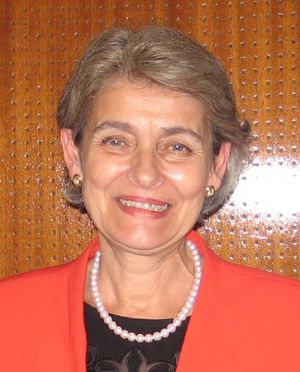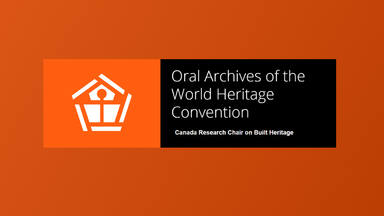
Interview
Irina Bokova
World Heritage Convention
Irina Bokova is a Bulgarian politician and diplomat. She served as Director General of UNESCO from 2009 to 2017.
She graduated from the Moscow State Institute of International Relations, and has also studied at the University of Maryland and the John F. Kennedy School of Government at Harvard University. She began her career at the United Nations Department of the Bulgarian Ministry of Foreign Affairs in 1977. She was subsequently appointed to the Bulgarian Permanent Mission to the United Nations in New York. Twice elected to the Bulgarian Parliament, she served as interim Minister of Foreign Affairs between 1996 and 1997. She has been Bulgaria’s ambassador to France, Monaco and UNESCO, in addition to representing the president of her country within the International Organization of La Francophonie. Bokova is particularly renowned for her commitment to the integration of Bulgaria within the European Union.
Elected as Director General of UNESCO in 2009, she is the first woman and the first person from Eastern Europe to hold this position. During her two terms, she worked for the organization's major causes such as education for all, gender equality, scientific cooperation and cultural dialogue. She has received numerous honors from different countries, as well as several honorary doctorates from major universities.
Interview with
Irina Bokova
18 May 2018, Paris, France
The following audio excerpts are from an interview with Irina Bokova by Christina Cameron and Eng Sengsavang, 18 May 2018 in Paris, France. Bokova recounts her involvement as Director General of UNESCO in the implementation of the World Heritage Convention. She presents a nuanced and critical look at the political dimension inherent in the protection of cultural heritage and advocates values of dialogue, cultural diversity, human dignity and mutual aid. She also addresses the new challenges facing UNESCO today, such as intentional destruction of heritage by extremists and the importance of youth engagement and civil society.
- 1. The World Heritage Convention
- 1a. Involvement of Irina Bokova in World Heritage
- 1b. Key objectives of the World Heritage Convention
- 1c. Synergy between different UNESCO conventions
- 1d. Successes and failures of the Convention
- 2. The World Heritage Committee
- 3. The secretariat of the Convention : the World Heritage Centre
- 4. Conservation efforts of States Parties
- 5. Intentional destruction of World Heritage
- 6. The role of civil society
Oral Archives of the
World Heritage Convention
Under the leadership of the Canada Research Chair on Built Heritage at the University of Montreal, an international team of researchers conducts interviews with pioneers of World Heritage to capture memories of important moments in the history of UNESCO Convention.
Launched in 2006, this initiative is part of the UNESCO History project that celebrated the 60th anniversary of the creation of UNESCO. The Oral Archives project records the precious witness of people closely associated with the creation and implementation of the Convention. Their recollections and views have greatly enriched the book by Christina Cameron and Mechtild Rössler, Many Voices, One Vision: The Early Years of the World Heritage Convention (Ashgate/Routledge, 2013).
